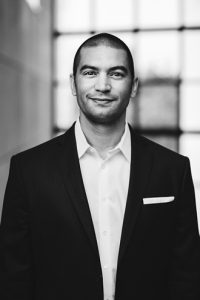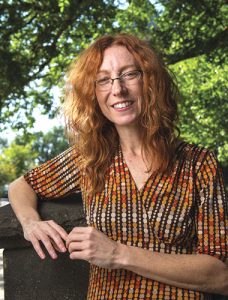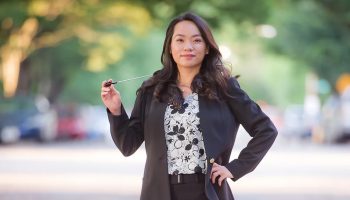

No matter how integral the concept of voice is to Adrian Matejka, Indiana’s poet laureate is grateful that there is a difference between his voice “in the world” and the voices that animate his poetry.
“If I talked in a conversation like I ‘talk’ in a poem, I wouldn’t have any friends,” Matejka said.
Like the many voices that echo across his National Book Award and Pulitzer Prize-finalist The Big Smoke, a collection on which he presented at Chautauqua Institution in 2016, the voices of Matejka’s poetry are fluid and organic. Yet, he noted, they are still dictated by conventions. Inside his work, his voice “is shaped by the words and sounds that inspire (him),” but its construction is still not what one would expect to hear peppering a conversation over coffee, or during a discussion of weather.
Citing Tyehimba Jess’ “extraordinary mastery” of voices in his Pulitzer Prize-winning Olio, as well as Gabrielle Calvocoressi’s Rocket Fantastic, Matejka also turns to Terrance Hayes, Ai Ogawa and Week One poet-in-residence Martha Collins when searching for work that demonstrates “surprising” points of view.
“Poets are naturally restless with their voices,” Matejka said.
As the final poet-in-residence of the 2019 season at the Chautauqua Writers’ Center, Matejka will cultivate “a generative space of give-and-take and give some more” in his Week Nine workshop, “With a Voice Like That You Should Be on the Radio.” Beth Loffreda, inaugural chair of Pratt Institute’s Department of Writing and Chautauqua’s final prose writer-in-residence of 2019, joins Matejka at the Writers’ Center to teach her Week Nine workshop, “What We (Don’t Know We) Carry.” Both authors will offer a reading at 3:30 p.m. Sunday, August 18 in the Hall of Philosophy.
The author of Losing Matt Shepard and co-editor of The Racial Imaginary: Writers on Race in the Life of the Mind, a collection of essays she co-edited with Claudia Rankine, Loffreda described the conversations her workshop hopes to engage as “feeling really necessary for writers and artists.” Alert to the cultural “inheritances” creators carry, knowingly or not, in an era quick to “cancel,” Loffreda will help writers navigate “the ways that vectors of identity limit imagination” — an act of healthy “grappling.”
“Culture has an impact on imaginative range, and it’s OK to acknowledge that,” she said. “It can feel like you risk turning that into a conversation that feels imbued with shame; there is the risk of giving offense. I just think we have to have it.”
“Committed” to teaching queer theory — she served on the Queer Studies Advisory Board and taught the core queer theory course for the queer studies undergraduate and graduate minors at the University of Wyoming — Loffreda characterized an understanding of the critical field as “a practice of undoing shame.”
“Shame is such a powerful force in our culture,” Loffreda said. “I feel like this is connected to the work in this kind of workshop — getting past one’s own shame, or fear of being shamed, to get to a more honest and open approach.”
At its core, she said, her workshop teaches “how to be a better reviser.”
“Revision isn’t only about technical aspects of one’s work,” she said. “Discovering places where one has unwittingly reproduced a stereotype or a habit of mind that one would actually want to be rid of is important, too. I hope students will leave with an enlarged capacity for the necessary self-reflection that goes into revisions.”
For Matejka, the workshop will be a “poetry community that can be critical and supportive at the same time.”
“If there’s a takeaway from my workshops, it is that there’s no such thing as a wrong poem,” he said. “If the poem needs to be written, it’s valid, factual and necessary.”




